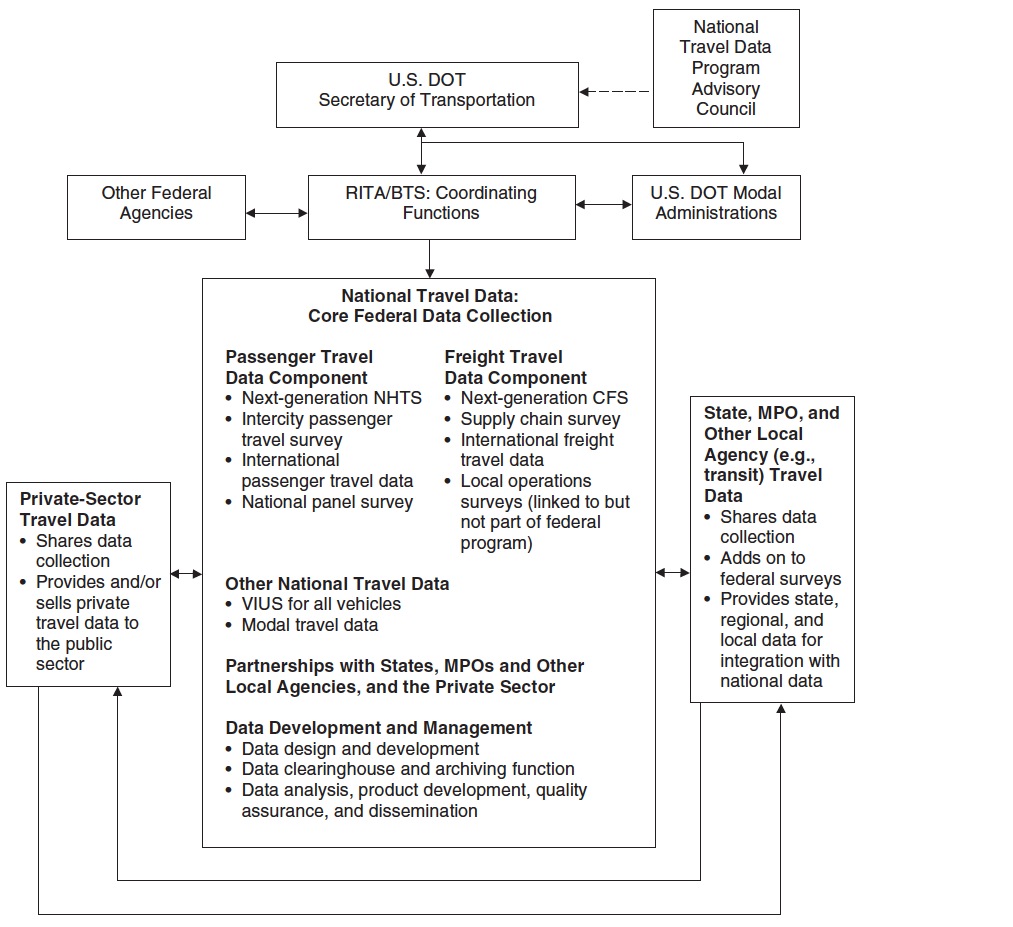TRANSPORTATION RESEARCH BOARD
Executive Summary
The U.S. transportation system serves hundreds of millions of travelers and handles millions of tons of freight each day to help ensure the efficient movement of people and goods in support of personal goals and domestic and international commerce. A well-functioning transportation system is essential for business travel and tourism, yet no national data have been collected on long-distance, intercity passenger travel by surface transportation modes since 1995. A strong economy depends on state and regional investments in freight corridors to keep freight moving, but industry-based data on freight shipments, focused on supply chain linkages and local goods movement, are not collected. Only coarse national-level data are available on intercity commodity flows. Increased energy efficiency and reductions in greenhouse gas emissions from vehicular travel are being sought to reduce the transportation sector’s adverse environmental impacts, but data on vehicle use necessary to monitor progress are no longer being collected.
Good travel data are essential to support critical policy choices and multimillion dollar investments facing decision makers. Unfortunately, as the previous examples demonstrate, the travel data available today are inadequate to meet this demand. The most comprehensive data are collected by the federal government in periodic surveys. However, coverage of these surveys is incomplete, sample sizes frequently are insufficient to support meaningful analyses, and the results often are not timely. Moreover, funding for these surveys is subject to shifting political priorities, not infrequently putting them at risk for cancellation.
This study assesses the current state of travel data at the federal, state, and local levels and defines an achievable and sustainable travel data system that can support public and private transportation decision making. The primary goal is to develop a strategy for structuring, conducting, and funding the collection of critical travel data. The study is national in scope, recognizing that travel data are collected and used at multiple geographic levels and by multiple sectors. It covers all travel modes, with a focus on measuring the performance of the transportation system as a whole. The results are directed to Congress; senior leaders and data program managers at the U.S. Department of Transportation (U.S. DOT) and other federal agencies; states; metropolitan planning organizations (MPOs); other transportation authorities; and firms that collect, analyze, and disseminate travel data.
Collection of travel data is a shared responsibility among various administrations within U.S. DOT and other federal agencies. The states, MPOs, and the private sector also collect travel data, primarily for their own uses. These disparate data collection activities do not constitute a coherent national program to meet decision-making needs. A well-integrated National Travel Data Program is needed to guide transportation policies and investments at all levels. The following paragraphs provide a brief overview of the committee’s recommendations for achieving such a program; details are presented in the concluding chapter of this report.
To support the wise use of public resources for transportation, particularly in a time of slow growth and massive budget deficits, a National Travel Data Program should be organized and sustained; built on a core of essential travel data whose collection is sponsored at the federal level; and well coordinated with travel data collected by states, MPOs, transit agencies, and the private sector (see Figure ES-1). Logically, the responsibility for leading this effort must reside with U.S. DOT, despite its past failures to develop a comprehensive and effective travel data program, because these data are essential to its mission. The Secretary of Transportation should assume a strong leadership role, with program design and coordination being carried out by the Research and Innovative Technology Administration (RITA) and its Bureau of Transportation Statistics (BTS), the federal statistical agency for transportation, which already has a data collection and coordination mandate.
Download full version (PDF): How We Travel
About Transportation Research Board
www.trb.org
“The mission of the Transportation Research Board is to provide leadership in transportation innovation and progress through research and information exchange, conducted within a setting that is objective, interdisciplinary, and multimodal.”
Tags: Data, National Academy of Sciences, National Research Council, Transportation Research Board, TRB







 RSS Feed
RSS Feed